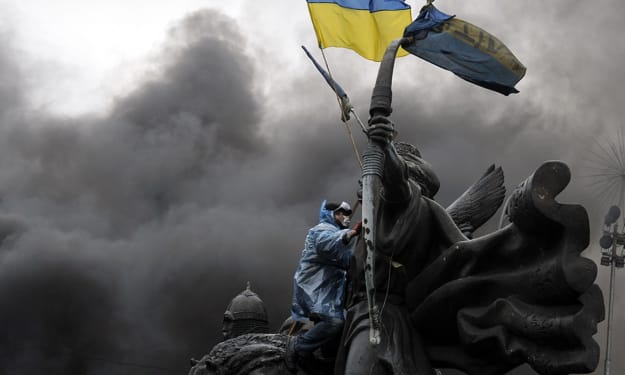The Capital Punishment Problem
What does it really mean to be opposed to the death penalty?

Many Newcastle United fans, like myself, were recently subject to attacks in the media when it transpired that the Saudi Arabian government, who (although not "technically") essentially own the club, executed an extraordinary 81 people on one day in March. It brought to light the subject of sports washing by regimes such as this, whereby investment in something like a struggling football club helps shift western attention away from such atrocious activites as this. Now, that in itself is a big and complicated discussion, but I want to focus on the nature of the crime here. 81 people in one day is astonishing. I think that even those in the west who believe in the death penalty would agree. And I think one of the main reasons for this is that, although we cannot know for sure, many of the crimes that are punishable by death in Saudi Arabia are not remotely as severe as what some of us in the west would deem worthy of capital punishment. The other main reason it is so shocking, I think, is that the nature of the statistic implies there isn't much time taken to have trials or investigations before the death penalty is given. Let's compare this to say, the USA, where people spend years and years on death row going through the appeal process before they are eventually executed.
Now, let's unpack this western reaction to this news and see what it says about our attitude to capital punishment. Most people, when arguing against the reintroduction of the death penalty in my country, the UK, will cite the various examples of the awful miscarriages of justice that occurred when it was legal. The most famous of these was the case of Timothy Evans, who was hanged in 1950 for the murder of his wife and child. It later transpired that the killings were actually committed by his neighbour John Christie, who turned out to be a serial killer. Christie himself was hanged in 1953 and the eerie story was turned into a film in 1971, '10 Rillington Place,' starring John Hurt as Evans and Richard Attenborough as the sinister Christie. The story is famous in Britain and was one of the main reasons we abolished capital punishment in 1965. This punishment has never been reinstated in the UK and subsequent events have only added to the common argument of miscarriage of justice as to the reason why. Many of these involve people who were wrongly convicted of IRA bombings on British soil during the troubles, such as the Birmingham Six, the Guildford Four and the Maguire Seven. The presiding judge of the trial of the Guildford Four, Justice John Donaldson, infamously stated that he wished that the death penalty had still been legal at the time of the trial, so he could send the men to the hangman's noose. As they were innocent, this is chilling to think of. And it is why the majority of people in the UK, I think, do not believe in the death penalty.

However, I would argue that many of these people actually do believe in the death penalty. They just don't think it should be legal because of the concern that miscarriages of justice may occur. I think that if you could prove beyond a shadow of a doubt that a person was guilty, these people would like to see them executed by the state, for crimes such as horrific cases of murder, rape or child abuse. The film '12 Angry Men,' which I recently rewatched, concerns a jury that are about to send an eighteen year-old boy to the electric chair for murder, until Henry Fonda's juror stands alone to vote 'not-guilty,' the men argue and unpack the particulars of the case, and it begins to transpire that the boy is probably not-guilty after all. It's a brilliant, if not a little far-fetched, plot, that demonstrates the terrifying prospect and consequences of the miscarriage of justice, but I think the film is more about the nature of human judgment and the value of human life. I don't think Henry Fonda's character in that film would be a proponent of the death penalty if asked, becuase he regularly states how insane the degree of ease with which his fellow jurors would send a boy to his death. It is a worrying portrayal of how little we as human beings value the lives of our fellow man. On top of this, a friend of my father's stated that, when he sat on a jury, it reminded him of the film. And, like I say, I think even most people who oppose the death penalty because they don't want to see people wrongfully put to death, would still hold the belief that, if they could prove it, then, yes, they would happily see such people put to death. When watching '10 Rillington Place,' I imagine nobody has much remorse or feels it is wrong when the monster Christie is put to death.

I used to be one of those people. But my opinion has changed numerous times over the years. I stopped believing in capital punishment when I decided that everyone deserves a second-chance. But I'm not too sure that I fully believe that any more. I think, and it's difficult to say, that for some people there really really is no going back from the darkest of the dark, and the world really would be a better place without them in it. I believe in the existence of pure evil. However, it is not for me, or the government, or any other human being, to make that decision and take a life. It doesn't matter if you can prove beyond a shadow of a doubt the guilt or lack of remorse of an evil mind, you can never truly, truly, know where that mind will go or what that person will do. How is it for you to stoop to their level and take a life because you believe they deserve it? As Jordan Peterson has stated, those who commit murder or attack the innocent are doing just that. So what logic is there to punishing them by doing the same thing?
I've also been re-reading 'The Lord of the Rings,' and there is a passage which sums up the whole thing brilliantly. In the scene, Frodo, when talking about Gollum, a character who has gone to the darkest place he can go and for whom there is, and never will be, any redemption, says "It's a pity Bilbo didn't kill Gollum when he had the chance," to which the wizard Gandalf replies:

At the end of the story, which differs slightly in the book to the film, Frodo fails in his quest and Gollum takes the ring from him, but in his joy slips and falls to his death and the destruction of the ring, ending the evil power of Sauron and its hold on Middle-Earth. Had Bilbo killed Gollum, this would never have happened. This is just another story like the others I've discussed, and one which obviously has little basis in any true events, but stories like this exist to demonstrate profound points about mankind's role in the battle between good and evil, and Tolkien was a master of his craft. It's not about whether evil is in question (as in miscarriage of justice) or whether the punishment fits the crime, it’s about the fact that it is not, and never will be, our place as human beings to decide the fate of our fellow man.
About the Creator
Matty Long
Jack of all trades, master of watching movies. Also particularly fond of tea, pizza, country music, watching football, and travelling.
X: @eardstapa_






Comments
There are no comments for this story
Be the first to respond and start the conversation.